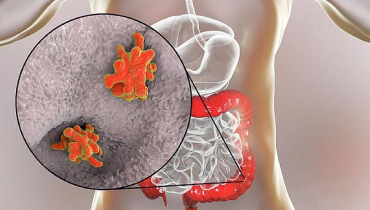Metronidazole is a bactericidal antibiotic. It penetrates bacterial cell walls, destroys DNA and inhibits DNA synthesis of certain microorganisms. Tinidazole is related to nitroimidazole with a similar mechanism of action but more limited clinical use.

Pharmacokinetics
Oral metronidazole is well absorbed. It is usually administered intravenously only if patients cannot receive oral treatment. It distributes well in body fluids and penetrates the cerebrospinal fluid, resulting in high concentrations.
Metronidazole is metabolized mainly in the liver and is excreted mainly with the urine, but its excretion is not reduced in patients with renal insufficiency. However, since metabolites of metronidazole may accumulate in patients with end-stage renal failure, these patients should be monitored for metronidazole-related side effects, such as effects on the central nervous system causing headaches, seizures and peripheral neuropathy (mainly numbness or paresthesias of the extremities).
Tinidazole has a slightly longer half-life than metronidazole, allowing it to be used less frequently.
Indications for metronidazole and tinidazole
Metronidazole is active against:
- All obligate anaerobic bacteria (it has no activity against facultative anaerobic and aerobic bacteria)
- Certain protozoan parasites (e.g., Trichomonas vaginalis, Entamoeba histolytica, Giardia intestinalis [lamblia])
Metronidazole is used primarily for infections caused by obligate anaerobes, often with other antibacterial drugs. Metronidazole is the drug of choice for bacterial vaginosis. The drug has other clinical uses.
Tinidazole is used mainly for the protozoan parasites mentioned above. It is not used for systemic anaerobic bacterial infections.
Contraindications for the use of metronidazole and tinidazole
Contraindications for the use of metronidazole and tinidazole
Administration during pregnancy and lactation
Reproductive studies with metronidazole in some animal species have shown an increased risk of carcinogenic activity. Adequate controlled studies on use in pregnancy have not been conducted. Most human studies have not shown an increased risk of cancer, birth defects, or other adverse effects on the fetus after maternal use of metronidazole during pregnancy; however, some studies have noted that harelip (with or without a wolf’s palate) has been found in infants whose mothers took metronidazole during the 1st trimester of pregnancy. Some experts advise avoiding metronidazole during the 1st trimester, although the 2021 Centers for Disease Control and Prevention (CDC) guidelines for the treatment of sexually transmitted infections indicate that a single dose of 2 g is possible for treatment of trichomoniasis at any stage of pregnancy.
Metronidazole penetrates into breast milk; use during lactation is not recommended.
There are limited data on the use of tinidazole in pregnancy, but since animal studies indicate a moderate risk, tinidazole is avoided during pregnancy. Breastfeeding should be delayed for 72 hours after a single oral dose of 2 g of tinidazole.

Side effects of metronidazole and tinidazole
Side effects of metronidazole and tinidazole include:
- Gastrointestinal disorders.
- Effects on the central nervous system and peripheral neuropathy
- Disulfiram-like reaction
Nausea, vomiting, headache, seizures, syncope, other central nervous system effects, and peripheral neuropathy may occur; rash, fever, and reversible neutropenia have been reported. Metronidazole may cause a metallic taste in the mouth and dark urine. Reactions similar to those with disulfiram (including flushes, headache, nausea, and vomiting) may occur if alcohol is consumed within 7 days after use.
A slightly lower incidence of gastrointestinal disturbances may be seen with tinidazole.
Dosing recommendations for metronidazole and tinidazole
Doses of metronidazole and tinidazole are not reduced in patients with renal impairment. Doses of metronidazole are usually reduced by 50% in patients with serious liver disease; the use of tinidazole in liver disease has not been studied, so it should be used with caution, if used at all.
Metronidazole and tinidazole inhibit warfarin metabolism and may increase its effects as an anticoagulant.












I received the package a few days ago. Thank you so very much! Everything was perfect. I do appreciate your great service and will most definitely order again from you. I'm glad to say that I can recommend you with total confidence. Thanks
Yeah! The package arrived very quickly. Thanks!
Everything is fine! Thanks!